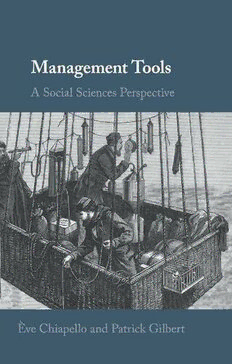
Management Tools: A Social Sciences Perspective PDF
Preview Management Tools: A Social Sciences Perspective
Management Tools Noorganisationisimmunefromtheinfluenceofmanagementtools. Such tools as norms, indicators, ranking, evaluation grids and man- agement control systems have moved outside the managerial and consultancy realm within which they were first developed to reach publicadministrationsandpolicy-makers,aswellasarangeofother governmental and non-governmental organisations. Taking manage- menttoolsoutofthepracticalandutilitariancontextstowhichthey are often consigned and approaching them from a social analytical perspective, this book gives primacy to these everyday objects that constitutethebackgroundoforganisationallifeandremaintoooften unquestioned.Bringingtogetherdevelopingstreamsofresearchfrom anthropology,politicalscience,socialpsychology,sociology,account- ing,organisationtheoryandmanagement,ÈveChiapelloandPatrick Gilbert offer an unprecedented theoretical synthesis that will help managers, scholars and policy-makers to unpack the functional and dysfunctionalrolesandeffectsofmanagementtoolswithinandacross organisations. È is Professor at Ècole des hautes études en sciences sociales (EHESS), Paris, where she holds a chair in the ‘Sociology of thetransformationofcapitalism’.ShewaspreviouslyProfessoratthe HEC School of Management, Paris. Her previously published works comprise numerous articles and books including: Artistes versus Managers(1998),andLenouvelespritducapitalisme(1999,withLuc Boltanski,translatedintoninelanguages,includingEnglishin2005). holds a Ph.D. in Management and graduated in OrganizationalPsychology.HeisEmeritusProfessorattheSorbonne Business Scool (IAE Paris) and Research Director at the Mutations AnticipationsInnovationsChair.Heisalsoamemberoftheboardof several scientific societies, such as the Association francophone de Gestion des Ressources Humaines (AGRH) and Association Interna- tionaledePsychologieduTravaildeLangueFrançaise(AIPTLF). Management Tools A Social Sciences Perspective ÈVE CHIAPELLO ÉcoledesHautesEtudesenSciencesSociales,Paris IAEParis SorbonneBusinessSchool In collaboration with , - MARION BRIVOT CARINE CHEMIN BOUZIR AND BÉNÉDICTE GRALL UniversityPrintingHouse,CambridgeCB28BS,UnitedKingdom OneLibertyPlaza,20thFloor,NewYork,NY10006,USA 477WilliamstownRoad,PortMelbourne,VIC3207,Australia 314 321,3rdFloor,Plot3,SplendorForum,JasolaDistrictCentre, NewDelhi 110025,India 79AnsonRoad,#06 04/06,Singapore079906 CambridgeUniversityPressispartoftheUniversityofCambridge. ItfurtherstheUniversity’smissionbydisseminatingknowledgeinthepursuitof education,learning,andresearchatthehighestinternationallevelsofexcellence. www.cambridge.org Informationonthistitle:www.cambridge.org/9781108428958 DOI:10.1017/9781108553858 ©ÈveChiapelloandPatrickGilbert2019 ThiseditionisanadaptedtranslationofSociologiedesoutilsdegestion:Introductionà l’analysesocialedel’instrumentationdegestion,publishedbyLaDécouvertein2014 (9782707151452). Thispublicationisincopyright.Subjecttostatutoryexception andtotheprovisionsofrelevantcollectivelicensingagreements, noreproductionofanypartmaytakeplacewithoutthewritten permissionofCambridgeUniversityPress. Firstpublished2019 PrintedandboundinGreatBritainbyClaysLtd,ElcografS.p.A. AcataloguerecordforthispublicationisavailablefromtheBritishLibrary. LibraryofCongressCataloginginPublicationData Names:Chiapello,Ève,author.|Gilbert,Patrick,author. Title:Managementtools:asocialsciencesperspective/ÈveChiapello,Écoledes HautesEtudesenSciencesSociales,Paris,PatrickGilbert,IAEParis;incollaboration with[threeothers]. Othertitles:Sociologiedesoutilsdegestion.English Description:Cambridge,UnitedKingdom;NewYork,NY:CambridgeUniversityPress, [2019]|“ThiseditionisanadaptedtranslationofSociologiedesoutilsdegestion: introductional’analysesocialedel’instrumentationdegestion,publishedby LaDecouvertein2014.” Identifiers:LCCN2019007595|ISBN9781108428958(hardback:alk.paper)| ISBN9781108451727(pbk.:alk.paper) Subjects:LCSH:Management Socialaspects.|Organizationalsociology. Classification:LCCHD30.19C45132019|DDC302.3/5 dc23 LCrecordavailableathttps://lccn.loc.gov/2019007595 ISBN9781108428958Hardback CambridgeUniversityPresshasnoresponsibilityforthepersistenceoraccuracy ofURLsforexternalorthirdpartyinternetwebsitesreferredtointhispublicationand doesnotguaranteethatanycontentonsuchwebsitesis,orwillremain,accurateor appropriate. Contents ListofFigures pagexi ListofTables xii Acknowledgements xiii HowtoUseThisBook xvii Introduction: Organisations asWorlds of Management Tools 1 PART I THEORETICAL FOUNDATIONS FOR THINKING ABOUT MANAGEMENT INSTRUMENTATION 9 1. Theoretical Foundations: From the Study of Technique to the Analysis ofManagement Tools 11 SpontaneousDiscourseaboutTechnique 12 DenialofTechnique,ortheInsignificanceoftheObject 12 TechnophileEuphoria 14 TechnophobicReaction,orTechniqueasaSnare 15 FalseDebatesandRealImpasses 17 TheContributionsofAnthropology 18 ConsideringTechnique:TheTechnologicalProject 18 ConcerningtheStudyofTechniqueandItsTools 21 SomeLessonsfortheStudyofManagementTools 22 ManagementasanIntangibleTechnique 24 Management:ATechniqueUnlikeOthers 24 TheSpecificityofIntangibleTechniques 25 WhatIsaManagementTool? 26 ACommonSenseNotion 26 DescribingaManagementTool 27 Conclusion 31 v vi 2. Traditional Approaches: Management Tools in the History ofOrganisation Theory 32 RationalistTheoriesorTechniqueasaSolution 33 ManagementToolsfromaScientificManagement Perspective 34 ManagementToolsandtheRationalSystemsSchool 37 ManagementToolsandtheSchoolofContingency 38 NormativeTheories,betweenForgettingandMinimising Technique 39 ThePervasivenessofRationalBeliefs 43 TheRationalDiscoursePrevailsDespitetheAlternationof TheoreticalOrientations 43 TheRationalApproachIsReinforcedbytheConsultants 47 GoingBeyondClassicalApproaches 48 TheSocioTechnicalApproach 49 TheBehaviouralTheoryofOrganisations 50 Afterthe1980s:RenewedInterestfortheInstrumentation ofManagementinFrenchAcademia 51 Conclusion 53 PART II THREE MAJOR TYPES OF SOCIAL SCIENCE APPROACHES 55 3. Critical Perspectives onManagement Tools 59 Thesis1:ToolsImplicatedinRelationshipsofDomination 61 TheToolasanElementofaSocialandEconomicSystem 62 TheToolintheLegitimationofSocialHierarchies 64 TheToolasaLeverofExploitation 65 TheToolastheResultofPowerRelations 66 TheToolasaResourceinaStruggle 68 SummarySheet(Thesis1) 73 Thesis2:TheToolasaTechniqueforDisciplineand Government 75 ManagementToolsasApparatusesofKnowledge/Power 76 vii ManagementToolsasaDisciplinaryTechnique 77 ManagementTechniquesasaToolofGovernment 79 ManagementTechniquesasTechnologiesoftheSelf 81 SummarySheet(Thesis2) 87 Thesis3:TheToolAlienatesandDehumanises 91 ClinicalApproaches 91 CritiqueoftheManipulativeProject 94 TheCritiqueofTechnicismandtheDiscardingof Subjectivity 96 SummarySheet(Thesis3) 98 4. Institutionalist Perspectives onManagement Tools 100 Thesis4:ManagementToolsInfluencedbyInstitutional Strategies 102 TheFoundingConcepts:FieldLevelInstitutionsand Isomorphism 102 FromSimilaritytoVariety:Researchbetween1990 and2000 105 TheDistinctionbetweenLegitimacy,Efficiencyand Decoupling 107 Power,ConflictandInstitutions 108 TransnationalisationandInternationalStandards 110 SummarySheet(Thesis4) 115 Thesis5:ToolsasInvestmentinForms 118 TheConventionalistApproach 118 TheSociologyofQuantificationandClassifications 121 AnalyticalPerspectivesonManagementTools 127 SummarySheet(Thesis5) 138 Thesis6:TechnologyIsBothConstrainingandEnabling 142 StructurationTheory(ST):SomeoftheCentralConcepts 142 ThePlaceofTechnologyinProcessesofStructuration: TwoDifferentOntologiesbutComplementaryEmpirical Results 146 SummarySheet(Thesis6) 150 viii 5. Interactional Perspectives on Management Tools 153 Thesis7:TheToolIsaHuman/NonHuman Arrangement 155 TheSymmetrybetweenHumansandNonHumans 155 NetworkandtheTranslationProcess 156 ObjectsasHuman/NonHumanArrangementsandthe NotionofPerformation 157 UnderstandingtheImplementationandRoleofthe ManagementToolwithinanOrganisation 158 SummarySheet(Thesis7) 166 Thesis8:TheToolIsNothingoutsidetheActivitySystem 169 FromTooltoInstrument 169 IndividualActivityMediated 171 ActivityandCollectiveWork 173 SummarySheet(Thesis8) 177 Thesis9:TheToolasaLanguageBeing 179 WrittenTextasaManagementTool 180 TheManagementToolasaSupportforSensemaking 184 TheManagementToolasText 185 SummarySheet(Thesis9) 187 Thesis10:TheEffectsoftheToolAreConditionedbyWhat ActorsDo 189 TheRelativisationoftheFormalSystem 190 ChangeRatherThanFunctioning 191 Tooland/orRules? 192 SummarySheet(Thesis10) 195 PART III SYNTHESIS 199 6. The Agency of Management Tools 201 AFrameworkfortheAnalysisofManagementTools 203 VocabularyIssues 203 Functions 204 Effects 207
